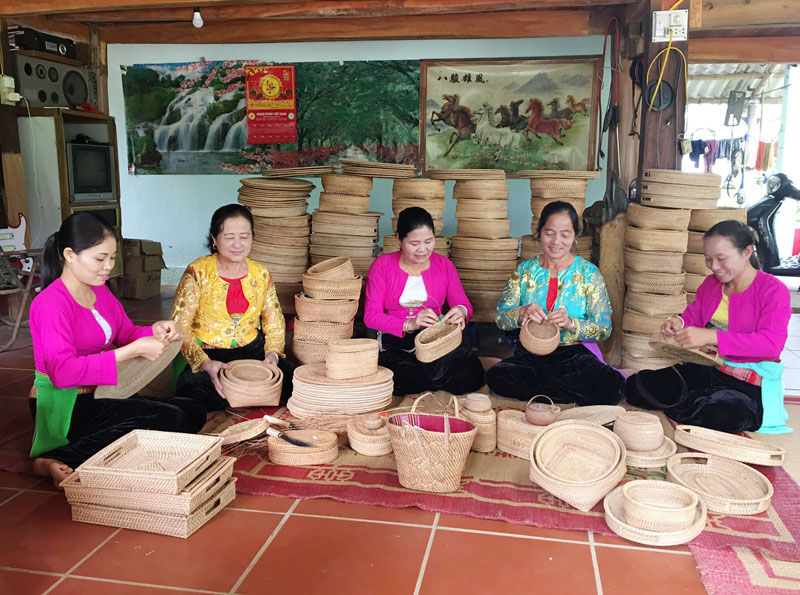
(HBO) – In an effort to improve the efficienucy of patriotic emulation movements, Lac Son district in Hoa Binh province has stepped up the building, dplication and honouring of role models.
 The rattan
and bamboo cooperative in Bui hamlet, Nhan Nghia commune, Lac Son district, is
an outstanding model in developing traditional crafts, and creating jobs and
increasing income of its members and women.
The rattan
and bamboo cooperative in Bui hamlet, Nhan Nghia commune, Lac Son district, is
an outstanding model in developing traditional crafts, and creating jobs and
increasing income of its members and women.
Role
models are sought in different sectors and from all social strata, especially
labourers and units that have overcome difficulties to move ahead.
One
of the role models is Bui Van Chun’s family in Doi hamlet, Van Nghia commune,
with a farm of bitter melon, pumpkin and cucumber in combination with pig
breeding. His family earns 100-110 million VND per year from the farm.
Another
is the family of Quach Phien from Chieng hamlet, Phuc Tuy commune (now Quyet
Thang commune) that has successfully developed a household economy model. From
growing 1.2ha of ‘doi’ trees for seeds, his family pockets over 600 million VND
each year and creates stable jobs for four local labourers.
In
implementing Plan No. 181 dated November 11, 2019 on duplicating role models in
Hoa Binh province, Lac Son district has selected the rattan and bamboo cooperative
run by Bui Thi Sanh in Bui hamlet, Nhan Nghia commune, and the "joining hands
for the community” model launched by the district police for the programme.
The
programme has helped to promote emulation movements across spheres in the locality.
The local Party Committee, authorities, armed forces, businesses and people are
joining hands in an emulation movement in 2020./.
Hoa Binh province is undergoing a dynamic transformation amid Vietnam’s national digital transition. Building on Poliburo’s Resolution No. 57-NQ/TW on breakthroughs in science, technology, innovation, and national digital transformation, the province has rolled out a wide range of practical action plans. A standout initiative is the "Digital Literacy for All” movement, an effort to ensure that no one is left behind in the digital era.
Hoa Binh province is undergoing a dynamic transformation in the wake of the national digital transformation movement. Building on Resolution No. 57-NQ/TW of the Politburo on breakthroughs in science, technology, innovation, and national digital transformation, the province has implemented a wide range of practical action plans. A standout initiative is the "Digital Literacy for All” movement ambitious effort to ensure that no one is left behind in the digital age.
With a spirit of unity and proactive problem-solving, the Party Committee, the government and the people of Dong Lai Commune (Tan Lac District) have made great strides in implementing the resolutions of the 24th Party Congress of the commune for the 2020 - 2025 term. Focusing on leadership and practical actions, the commune has brought the Party’s resolutions into daily life, creating strong impacts and pushing the local development forward.
Amid the nationwide push for digital transformation, young people in Hoa Binh Province are stepping up as dynamic pioneers, applying technology to enhance Youth Union operations and expand the reach of youth-led initiatives. Through creativity and adaptability, Youth Union organizations at all levels have introduced a series of practical solutions, contributing to modern governance and community development.
In recent years, An Nghia commune, located in Lac Son district, has stepped up administrative reform, focusing on improving the quality and efficiency of its single-window service unit for receiving and processing administrative procedures. These improvements have helped create favourable conditions for local residents and organisations to handle administrative procedures, contributing to the commune’s broader socio-economic development.
The Prime Minister-approved master plan to develop the multi-use value of forests ecosystems through 2030, with a vision to 2050, aims to improve the management and sustainable use of forest resources, create jobs, increase incomes, and improve the living standards of ethnic minorities, people in mountainous and remote areas, forest workers and those living near forests.



 The rattan
and bamboo cooperative in Bui hamlet, Nhan Nghia commune, Lac Son district, is
an outstanding model in developing traditional crafts, and creating jobs and
increasing income of its members and women.
The rattan
and bamboo cooperative in Bui hamlet, Nhan Nghia commune, Lac Son district, is
an outstanding model in developing traditional crafts, and creating jobs and
increasing income of its members and women.